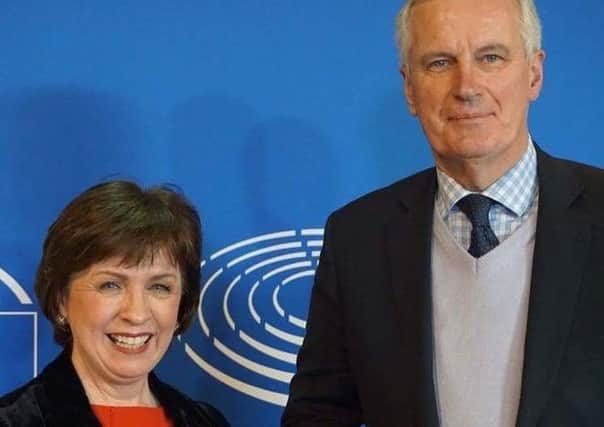2017 will be a defining year for NI agriculture: Dodds


Every new year brings it’s own challenges. Already 2017 is shaping up to be one, not only, of challenges on farm, but also one in which political decisions and events will shape agriculture in defining ways.
In Brussels the new year has brought a new focus for European Commissioner Phil Hogan with the launch of the consultation on the future of the Common Agriculture Policy (CAP).
Advertisement
Hide AdAdvertisement
Hide AdAlthough the United Kingdom is leaving the EU I will continue my work in influencing these policy decisions. The new CAP will ultimately dictate the level of support granted to our competitors and it will set standards for the European market.
It is absolutely vital that we work to influence these decisions so that we can continue to access European markets and that our farmers and agri food businesses remain competitive.
Of course, while this forward planning work continues, the regular farming issues keep coming up on the European agenda. Recently dairy farmers held demonstrations in Brussels where milk powder was sprayed on the European Council building in protest at the lack of a permanent crisis instrument preventing surplus of milk powder coming back onto the dairy market. In anticipation of this issue I recently met with the Commission to highlight the importance of releasing product back onto the market in a responsible way.
To date the Commission have been rightly cautious in their approach.
Advertisement
Hide AdAdvertisement
Hide AdAt home Northern Ireland farm gate prices are estimated to have risen some 53% between July (lowest point) and December (highest point) 2016. This is indeed welcome news.
However many farmers are not out of the woods yet due to cost of production and the overhang of debt incurred during the prolonged depression in prices.
The United Kingdom’s decision to withdraw from the European Union will, of course, be the greatest defining issue for agriculture in 2017 and beyond. Brexit continues to make headlines with the Prime Minister setting out her 12-point plan for future negotiations with the EU, the conclusions from the Supreme Court and the publication of the Bill in Parliament to allow for Article 50 notification to the EU.
For many within the sector the ability to shape an agriculture policy that fits our needs, is less focused on red tape and more on food production while at the same time supporting our family farm businesses is an exciting opportunity.
Advertisement
Hide AdAdvertisement
Hide AdHowever, following the Prime Minister’s speech, some within the industry have raised concerns or even pre judged the outcome of a trade deal that the UK may do with the United States or, for example, New Zealand. The desire for a global United Kingdom does not have to be to the detriment of UK agriculture. We have battled the same issues under the EU with little say as to how agriculture should be protected since, as EU members, we hand over all trade negotiations to the Commission. We only have to look at the predicted risks to the beef sector particularly within the EU-Mercosur negotiations. Only this week the EU has highlighted the need for trade negotiations with Mexico, Mercosur, Australia and New Zealand. Trade agreements are about give and take.
Importantly they also need to protect vulnerable industries. So far I am encouraged by the fact that DEFRA is to retain control of the agriculture elements of trade discussions.
While there has been some focus on a potential post Brexit deal between the UK and the USA the upcoming discussions on access to Europe’s markets will be no different. Just this week in the Agriculture committee I spent some time highlighting the importance of good market access to all of Europe’s farmers. Trade and tariff barriers are in no-one’s interest. The figures tell us that the UK imports much more agri food product from the EU than we export to it. In 2014 the UK exported €16 billion worth of agri food product to the EU but imported €40bn from the EU. 23% of UK cheese imports come from France while 43% of all Irish Agri-food exports are destined for the UK. The largest market for French wine is the UK. Trading arrangements with the EU that bring benefit for all are possible.
While we look to renew our mandate at Stormont I am determined to continue working closely with my party colleagues to ensure the agri-food sector here in Northern Ireland is represented in negotiations. Over the past eight weeks the DUP has met with the DEFRA Secretary of State, Andrea Leadsom and UK Farm Minister, George Eustice, on a number of occasions. In fact, both Ministers have visited Northern Ireland and met industry representatives. In Brussels and Strasbourg I have met with the EU’s chief Brexit negotiator Michel Barnier to ensure that the needs of Northern Ireland are high on the agenda.
It is imperative that we continue to maximise the representation that we have at Westminster and in Europe over the coming months. My colleagues and I are pledged to doing just that!